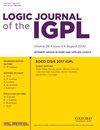Behaviour of Machine Learning algorithms in the classification of energy consumption in school buildings
IF 0.8
4区 数学
Q2 LOGIC
引用次数: 0
Abstract
The significance of energy efficiency in the development of smart cities cannot be overstated. It is essential to have a clear understanding of the current energy consumption (EC) patterns in both public and private buildings. One way to achieve this is by employing machine learning classification algorithms, which offer a broader perspective on the factors influencing EC. These algorithms can be applied to real data from databases, making them valuable tools for smart city applications. In this paper, our focus is specifically on the EC of public schools in a Portuguese city, as this plays a crucial role in designing a Smart City. By utilizing a comprehensive dataset on school EC, we thoroughly evaluate multiple ML algorithms. The objective is to identify the most effective algorithm for classifying average EC patterns. The outcomes of this study hold significant value for school administrators and facility managers. By leveraging the predictions generated from the selected algorithm, they can optimize energy usage and, consequently, reduce costs. The use of a comprehensive dataset ensures the reliability and accuracy of our evaluations of various ML algorithms for EC classification.机器学习算法在学校建筑能耗分类中的行为
能源效率对智慧城市发展的重要性怎么强调都不为过。清楚地了解当前公共建筑和私人建筑的能源消耗(EC)模式至关重要。实现这一目标的方法之一是采用机器学习分类算法,这种算法能从更广阔的视角来分析影响能耗的因素。这些算法可应用于数据库中的真实数据,使其成为智慧城市应用的重要工具。在本文中,我们特别关注葡萄牙某城市公立学校的EC,因为这在设计智慧城市中起着至关重要的作用。通过利用有关学校教育质量的综合数据集,我们对多种 ML 算法进行了全面评估。我们的目标是找出最有效的算法,对平均EC模式进行分类。这项研究的成果对学校管理人员和设施管理者具有重要价值。通过利用所选算法生成的预测结果,他们可以优化能源使用,从而降低成本。全面数据集的使用确保了我们对用于EC分类的各种ML算法进行评估的可靠性和准确性。
本文章由计算机程序翻译,如有差异,请以英文原文为准。
求助全文
约1分钟内获得全文
求助全文
来源期刊
CiteScore
2.60
自引率
10.00%
发文量
76
审稿时长
6-12 weeks
期刊介绍:
Logic Journal of the IGPL publishes papers in all areas of pure and applied logic, including pure logical systems, proof theory, model theory, recursion theory, type theory, nonclassical logics, nonmonotonic logic, numerical and uncertainty reasoning, logic and AI, foundations of logic programming, logic and computation, logic and language, and logic engineering.
Logic Journal of the IGPL is published under licence from Professor Dov Gabbay as owner of the journal.

 求助内容:
求助内容: 应助结果提醒方式:
应助结果提醒方式:


